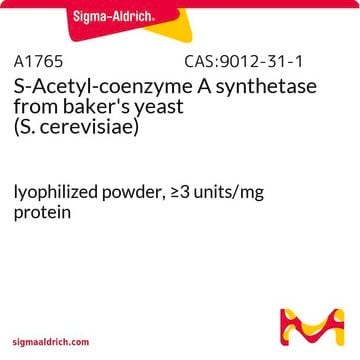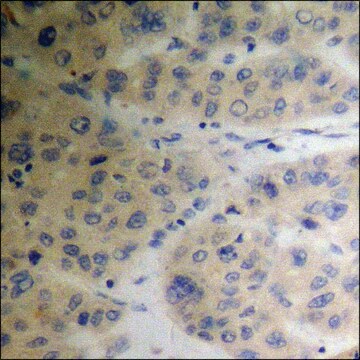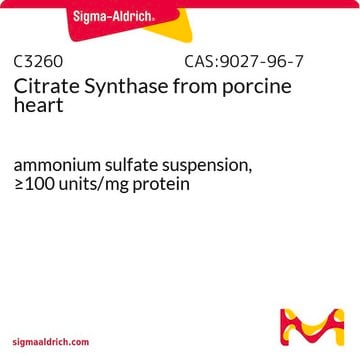P2783
Phosphotransacetylase from Bacillus stearothermophilus
lyophilized powder, ≥3,000 units/mg protein (biuret)
Synonym(s):
Acetyl-CoA:orthophosphate acetyltransferase, Phosphate acetyltransferase
About This Item
Recommended Products
form
lyophilized powder
Quality Level
specific activity
≥3,000 units/mg protein (biuret)
composition
Protein, ≥20%
shipped in
wet ice
storage temp.
−20°C
Looking for similar products? Visit Product Comparison Guide
Application
Biochem/physiol Actions
Unit Definition
Physical form
Signal Word
Warning
Hazard Statements
Precautionary Statements
Hazard Classifications
Eye Irrit. 2 - Skin Irrit. 2 - STOT SE 3
Target Organs
Respiratory system
Storage Class Code
11 - Combustible Solids
WGK
WGK 3
Personal Protective Equipment
Certificates of Analysis (COA)
Search for Certificates of Analysis (COA) by entering the products Lot/Batch Number. Lot and Batch Numbers can be found on a product’s label following the words ‘Lot’ or ‘Batch’.
Already Own This Product?
Find documentation for the products that you have recently purchased in the Document Library.
Articles
Enzyme Reagent Coenzyme A (CoA, CoASH or HSCoA) is the key cofactor in first step of the TCA cycle, responsible for transferring the acetyl group from pyruvate oxidation to oxaloacetate yielding citrate. Available through Sigma-Aldrich online.
Enzyme Reagent Coenzyme A (CoA, CoASH or HSCoA) is the key cofactor in first step of the TCA cycle, responsible for transferring the acetyl group from pyruvate oxidation to oxaloacetate yielding citrate. Available through Sigma-Aldrich online.
Enzyme Reagent Coenzyme A (CoA, CoASH or HSCoA) is the key cofactor in first step of the TCA cycle, responsible for transferring the acetyl group from pyruvate oxidation to oxaloacetate yielding citrate. Available through Sigma-Aldrich online.
Enzyme Reagent Coenzyme A (CoA, CoASH or HSCoA) is the key cofactor in first step of the TCA cycle, responsible for transferring the acetyl group from pyruvate oxidation to oxaloacetate yielding citrate. Available through Sigma-Aldrich online.
Our team of scientists has experience in all areas of research including Life Science, Material Science, Chemical Synthesis, Chromatography, Analytical and many others.
Contact Technical Service








